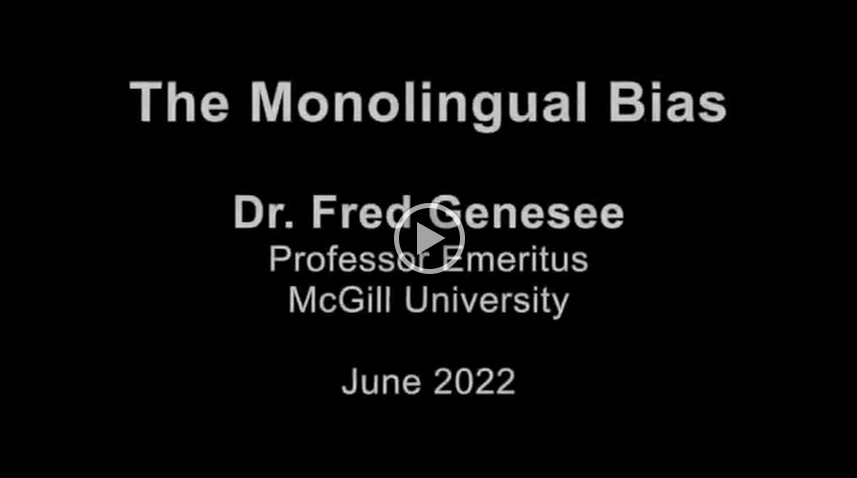The monolingual bias
An interview with Dr. Fred Genesee, Professor at Mc Gill University, Montreal, Canada, on his
on line article, The monolingual bias: A critical analysis, published in the Journal of Immersion
and Content-Based Language Education in January 2022.
A synopsis:
The monolingual bias refers to the viewpoint that people who speak only one language are
the norm and that bilinguals and multilinguals are exceptions to that norm. This bias has led
to the use of the developmental trajectory of monolinguals as the benchmark against which
the progress of all language learners is assessed and understood. Dr. Genesee argues that
using the developmental trajectory of monolinguals as the benchmark for learning second
language is not the best basis for judging the proficiency of second language learners nor the
competencies of second language learners.
The monolingual bias encourages the view that differences between a second language
learner and a monolingual user of the language are a deficit in the ability of the learner to
learn a second language rather than a reflection of the environment in which the learner is
acquiring another language. The monolingual bias does not take into account that a second
language learner may be using different neurological pathways than a monolingual, nor does
the monolingual bias take into consideration that the second language learners’ acquisition
and use of the new language is influenced by their prior linguistic experience.
However, it is not unreasonable to aim for native like monolingual proficiency; yet we should
appreciate that children may be learning another language in different ways from one
another. As educators, we should aim to understand the sources of those different ways of
acquiring a second language by taking a deep dive into knowing, holistically, the learner(s).
The second language learner(s) may have a complex learning profile that may implicate the
opportunity to learn the second language in a proficient manner. The opportunity for children
to express their full capacity to learn another language, and to use that language as a tool for
thought, relies heavily on the language learning environment.
The teaching in an immersion or in a CLIL program requires an awareness that goes beyond
what most people intuitively understand of language and how language is used. Courses for
teachers working in immersion or in a CLIL program should be rethought in light of what we
know now, and professional development offered to teachers should include courses and
workshops that address how we use language and how it is acquired. At the heart of meeting
the challenge of providing a rich language learning environment in immersion /CLIL schools
that optimize students’ learning of another language, is for teachers to know their learners in
depth so that the teachers can move their developmentforward. The monolingual bias should
not be used to limit our views of our students since research shows that virtually all (unless
clearly justified by empirical evidence) learners should have the opportunity to become
bilingual.
The monolingual bias :A critical analysis by Dr. Fred Genesee
Published online: 25 February 2022
https://doi.org/10.1075/jicb.21016.gen
Interviewer: Marcia Banks
